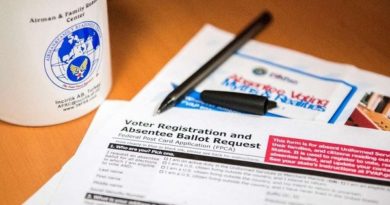Texas considers bills criminalizing voter fraud despite no evidence

In 2018, Tomas Ramirez III, a lawyer in the small town of Devine, Texas, ran as a Republican for justice of the peace and was elected to serve Medina county.
Two years later, the Texas attorney general’s office charged him with one count of engaging in organized election fraud, 17 counts of unlawful possession of a ballot, and 17 counts of unlawfully assisting voting by mail. The indictment accused 57-year-old Ramirez of illegally harvesting the ballots during the 2018 GOP primary.
Ramirez, who said he never possessed anyone’s ballot, did not understand why the state would bring the charges against him. He suspected that the Texas attorney general, Ken Paxton, needed something to back up his public claims of widespread voter fraud, and was willing to file charges against Ramirez and three women despite incredibly weak evidence.
The charges were ultimately dismissed – the state filed them again twice, but they were dismissed two more times – but Ramirez said the 19-month-long ordeal was hard on his family and jeopardized the future of his legal practice.
“To have to go through that process was pretty rough,” he said. “All the while, all I can do is shake my head and say, what on earth is happening and why is this happening to me.”
Texas’s legislature is currently considering several proposals to criminalize voters further, including a measure to enact election marshals who would enforce election law and respond to violations. Another proposal would further empower the attorney general to prosecute election crimes without support from local prosecutors. The proposals come in a state that’s one of more than a dozen to pass restrictive voting laws after the 2020 election, and where voting rights advocates say ballot access is already restricted in numerous, burdensome ways.
“These bills seem to be wanting to prosecute widespread voter fraud, yet there’s no evidence for these being needed right now other than conjecture or partisan politics,” said Katya Ehresman, the voting rights program manager for Common Cause Texas.
She said that often lawmakers like Paxton in Texas use the biannual legislative session to “create political theater” that will help them in their bids for re-election.
Voter fraud in Texas, like elsewhere in the US, is extremely rare. According to ProPublica, Paxton’s unit dedicated to pursuing election crimes opened at least 390 cases between January 2020 and September 2022, but secured just five convictions.
“They were spending millions of dollars to close like three or four cases a year,” said Daniel Griffith, senior policy director for non-partisan organization Secure Democracy USA.
Paxton has continued to tout his office’s work anyway, claiming a large number of defendants facing even more counts of voter fraud.
“I don’t know anything about these other cases,” Ramirez said. “All I know is if they have the same merit as mine, then there is no election fraud in Texas.”
Nonetheless, seven bills have moved forward in the state legislature that would further entangle people who allegedly commit voting crimes in the criminal legal system, and dozens of others have been introduced, according to the Voting Rights Lab, which tracks state legislation.
Specific laws
In 2021, Texas lawmakers passed an omnibus voting bill that added restrictions to the ballot including new rules for voting by mail and a ban on the distribution of mail-in ballot applications. But the bill, which was supported by Republicans in both chambers, also lowered penalties for voter fraud from a felony to a misdemeanor.
The House on Thursday debated a bill to raise the penalty once again to a state jail felony, the same level of crime for kidnapping or sexual coercion.
after newsletter promotion
“It’s largely a problem in search of a solution, especially as less than 18 months ago, both chambers agreed that a felony is not the level of penalty needed for these election issues,” Ehresman said. “We’re really worried that it’s an example of bad faith partisan attempts to subvert our elections and to create additional intimidation around our elections.”
Another bill would allow the attorney general to appoint a county or district attorney as a special prosecutor in an election case and would give the attorney general authority over election law. The first time Ramirez’s charges were dismissed was because the Texas court of criminal appeals ruled that Paxton did not have the authority to unilaterally initiate prosecutions on his own.
Ramirez said he believed the law would end up being struck down for the same reason Paxton’s earlier efforts were struck down in court.
“You cannot take what the Texas constitution has granted uniquely and exclusively to the judicial branch and peel away some of those powers and give them to the executive branch,” Ramirez said. “That violates the separation of powers.”
That bill hasn’t been scheduled for a floor vote yet, but it has had a hearing. Similarly, a separate bill would force Texas prosecutors to pursue election-related cases.
The bill to enact election marshals has proceeded out of a senate committee, raising alarms for voting rights advocates who warn that Florida’s similar effort to police voter fraud has cost taxpayers large sums of money and has largely come up empty.
“You’ve seen it play out in the way the Florida office has operated so far,” Griffiths said. “There have been some pretty high-profile arrests and then when you dig down to see what’s happening with the cases, they’re getting dismissed or they’re getting pled out to basically no punishment for the individuals.”
Ehresman also warned that it’s a bad bill because it would allow Texas department of public safety officials, who have limited training on election laws, to serve as marshals during election cycles.
“It’s bad and antithetical if the author of the bill and its supporters care about public safety,” she said.
This article has been archived for your research. The original version from The Guardian US can be found here.


